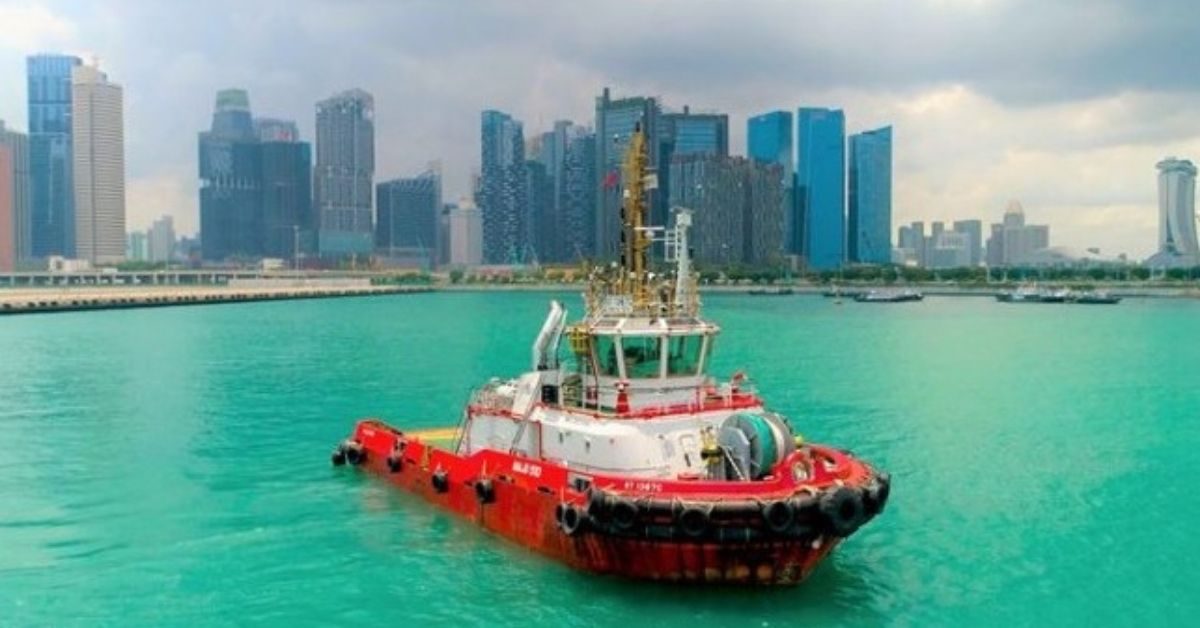This is the first tug to be built in India under the Approved Standard Tug Design Specifications (ASTDS) issued by the Ministry of Ports, Shipping, and Waterways (MoPSW) for promoting the shipbuilding industry under the Atmanirbhar Bharat initiative.
The 62-ton bollard pull Azimuth Stern Drive (ASD) tugs, designed by Canada’s Robert Allan Ltd, a top global tug designer, are primarily intended for harbour towing and ship assist in Indian ports with firefighting and coastal towing as secondary roles.
Ocean Sparkle ordered two 62-ton bollard pull tugs at Udupi-Cochin Shipyard Ltd, a unit of Cochin Shipyard Ltd, after the Ministry issued standard operating procedures in 2020 for charter/procurement of tugs by state-owned major ports under the Atmanirbhar Bharat initiative.
In April 2022, Adani Harbour Services acquired Ocean Sparkle at an enterprise value of Rs1,700 crore, helping it become the country’s top marine services operator (a key part of port operations). The combined entity now runs about 100 tugs.
Adani Harbour Services is a unit of Adani Ports and Special Economic Zone Ltd (APSEZ), India’s biggest private port operator.
In 2020, Cochin Shipyard Ltd acquired Udupi-based Tebma Shipyards Ltd under India’s bankruptcy law. Tebma Shipyards was earlier owned by bankrupt shipbuilder Bharati Defence and Infrastructure Ltd.
Udupi-Cochin Shipyard Ltd has an order book for building two 70-ton bollard pull tugs for Polestar Maritime Ltd, six 3,800 TDW Future Proof Dry Cargo Vessels for Norway’s Wilson ASA and some deep-sea fishing boats for Pradhan Mantri Matsya Sampada Yojana (PMMSY).
The Ministry of Ports, Shipping, and Waterways (MoPSW) recently finalised standard operating procedures (SOP) for progressive replacement of existing diesel-powered tugs with zero-emission tugs built locally for greening of operations at state-owned ports.
The Ministry has set a five-phase timeline ending 2047 by which the 12 state-owned ports must make their tug fleet fully green under the Green Tug Transition Programme (GTTP), per the SOP.
The state-owned ports have been given the flexibility to either purchase the ASTDS-GTTP compliant tugs or charter them for not less than 15 years.
The SOP for the Green Tug Transition Programme, hence, will require private tug owners/operators to acquire green tugs for doing business with the major ports.
Cochin Shipyard and Adani Group have signed a MoU for development of green tugs as part of the Green Tug Transition Programme initiated by the Ministry, Cochin Shipyard said.
In the first phase of the Green Tug Transition Programme, Jawaharlal Nehru Port Authority, Deendayal Port Authority, Paradip Port Authority and V O Chidambaranar Port Authority will each buy two new green tugs (battery electric powered) from Cochin Shipyard by 2027.
In the second phase of the Green Tug Transition Programme, between 2027 and 2030, at least 50 percent of the tugs operating in Jawaharlal Nehru Port Authority, Deendayal Port Authority, Paradip Port Authority and V O Chidambaranar Port Authority, should be green tugs.
Besides, at least 25 percent of tug fleets in all the other major ports under MoPSW should be GTTP compliant. This phase may also involve the adoption of alternate/green fuels such as methanol, hydrogen etc in addition to battery electric propulsion. Any other emergent green technologies can also be considered based on developments in the industry.
In the third phase (2030-2035), all ports under MoPSW should ensure that at least 50 percent of their tug fleet are GTTP compliant. In the fourth phase (2035-2040), all state-owned ports should ensure that at least 75 percent of their tug fleet are GTTP compliant. In the fifth phase (2040-2047), all the 12 major ports should ensure that 100 percent of their tug fleet are GTTP compliant. From the third phase onwards, the major ports can also consider new or additional emergent green technologies for tugs based on developments in the industry.







